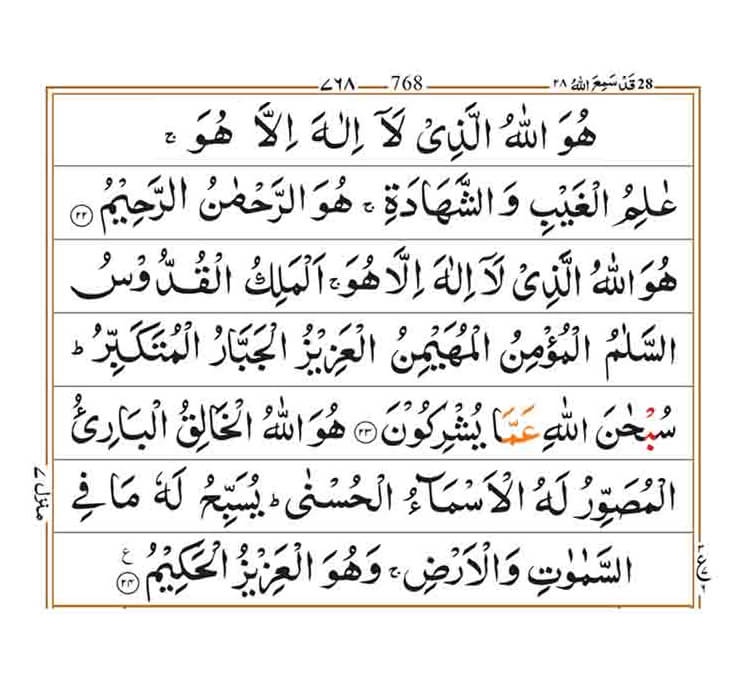Surah Momin, also known as “The Believer,” is the 40th chapter of the Quran. It offers guidance on faith, salvation, and the consequences of belief and disbelief. Surah Momin last 4 ayat are especially important for understanding Allah’s mercy, the power of repentance, and the warnings against disbelief. In this article, we will explore these last four verses, their meanings, and the lessons they teach.
What is Surah Momin?
Surah Momin is a Makki surah, meaning it was revealed in Mecca. It discusses themes of monotheism, the importance of faith, the reward for believers, and the consequences of disbelievers. The surah aims to strengthen the faith of Muslims, urging them to trust in Allah’s mercy while also warning about the consequences of rejecting His guidance.
The Last 4 Ayat of Surah Momin – A Breakdown
The last four ayat of Surah Momin carry a powerful message. These verses focus on repentance, the consequences of disbelief, and the mercy of Allah. Below is a breakdown of these verses:
- Verse 37: “And those who say, ‘Our Lord, do not place in our hearts any resentment toward those who have believed and say, ‘Our Lord, indeed You are full of kindness, Most Merciful.’”
- Verse 38: “Our Lord, indeed You are the One who will gather the people for a Day about which there is no doubt. Indeed, Allah does not fail in His promise.”
- Verse 39: “Indeed, those who deny the truth and the signs of Allah – He will punish them severely.”
- Verse 40: “Those who disbelieve and commit wrong will have the punishment of Hell.”
Key Themes and Meanings of Surah Momin’s Last 4 Ayat
The last four verses of Surah Momin carry several important messages for believers and disbelievers alike:
- Divine Mercy and Justice:
The verses highlight Allah’s mercy, especially toward those who turn to Him in repentance. They also emphasize His justice in dealing with the disbelievers, ensuring that every soul is held accountable for its actions. - The Power of Repentance:
The first verse reminds believers to keep their hearts free from hatred and to always seek Allah’s mercy. This serves as a reminder that sincere repentance is key to being forgiven by Allah. - Consequences of Disbelief:
The final two verses make it clear that those who reject Allah’s signs and disbelieve will face severe punishment. It serves as a warning that belief is essential for salvation, and disbelief leads to destruction.
Lessons We Can Learn from the Last 4 Ayat of Surah Momin
These verses are rich with lessons that can guide us in our personal lives:
- Understanding the Importance of Repentance:
One of the key lessons from these verses is the importance of repentance. Allah’s mercy is always available to those who sincerely seek forgiveness, and turning to Him can bring peace and relief. - Reminder of Allah’s Boundless Mercy:
The verses assure us that Allah’s mercy is unlimited. No matter how many wrongs a person has committed, Allah’s mercy is greater, and repentance can erase past mistakes. - Consequences of Disbelief:
Another important lesson is the warning against disbelief. These verses remind us that those who reject Allah’s guidance will face dire consequences, and it encourages us to remain firm in faith.
The Relevance of Surah Momin Last 4 Ayat in Our Daily Lives
The teachings of the last four verses of Surah Momin are not just for the past, but they are relevant to our daily lives as well. Here’s how these teachings can be applied today:
- Spiritual Reflection:
These verses encourage us to reflect on our actions and our relationship with Allah. They remind us to seek His forgiveness and to always strive for self-improvement. - Encouragement for Positive Change:
The verses urge us to turn to Allah in times of difficulty and to seek His mercy, knowing that He is always ready to forgive those who sincerely repent.
Tafsir (Interpretations) of the Last 4 Ayat
Islamic scholars have provided detailed interpretations (Tafsir) of these last four verses. Scholars like Ibn Kathir explain that these verses emphasize the importance of a clean heart and true repentance. The verses also highlight the day of judgment, when everyone will be judged according to their deeds. These interpretations encourage believers to take these teachings to heart and live with sincerity in faith.
How These Last 4 Ayat Align with Islamic Teachings
The lessons in these verses align closely with core Islamic beliefs:
- Core Beliefs:
The idea that repentance leads to forgiveness is a central theme in Islam. Belief in the Day of Judgment and accountability for one’s actions is also a fundamental teaching. - Encouragement for Faith and Righteousness:
These verses encourage believers to remain steadfast in their faith, be patient, and trust in Allah’s plan, regardless of the challenges they face in life.
Conclusion
The last four ayat of Surah Momin offer valuable lessons for all Muslims. They remind us of the power of repentance, the mercy of Allah, and the dire consequences of disbelief. By reflecting on these verses and incorporating their teachings into our daily lives, we can strengthen our faith and live in accordance with Allah’s guidance. Let these verses serve as a reminder to stay humble, seek forgiveness, and remain steadfast in our belief in Allah’s mercy.

